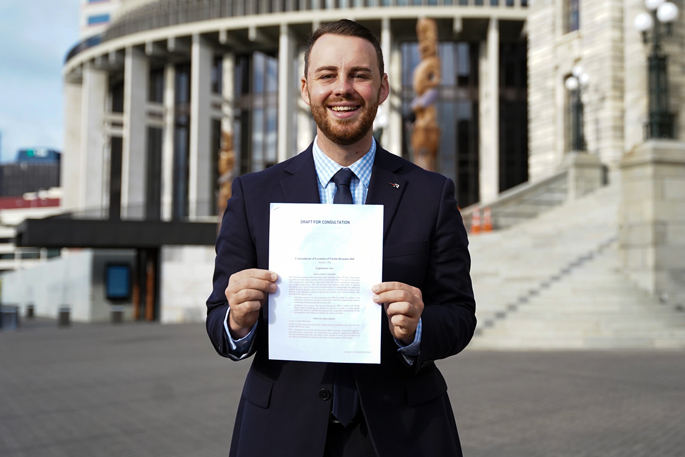A new members’ bill lodged by Bay of Plenty MP Tom Rutherford would see convicted murderers ineligible for parole if they do not reveal the location of their victim's body.
The Concealment of Location of Victim Remains Bill provides that offenders who refuse to disclose the location of a victim’s body may be denied parole.
“My Members’ Bill acknowledges the additional anguish faced by families who do not have a chance to lay their loved ones to rest, because of an offender’s refusal to disclose the location of a victim’s remains.”
This bill would amend section 9 of the Sentencing Act 2002 to include the failure of an offender to disclose the location of the body in a list of aggravating factors a sentencing court must take into account, says Rutherford.
“This would also insert a new section 28A into the Parole Act 2002 to require the Parole Board, when considering an offender for release on parole, to refuse parole unless the board is satisfied the prisoner has cooperated satisfactorily in the investigation of the offence to identify the victim’s location.
“This Bill has been modelled on legislation from the United Kingdom and New South Wales, passed in 2020 and 2022, respectively.”
The United Kingdom law was brought due to the murder of Helen McCourt, who disappeared in 1988 and whose body has never been recovered.
The offender was sentenced to life imprisonment with a non-parole period of 16 years and was released in 2020 and died in 2022 having never revealed the whereabouts of Helen's body.
In New South Wales, similar legislation has been adopted, colloquially known as ‘Lyn’s Law’ after former Sydney teacher Chris Dawson was convicted in 2022 of murdering his 33-year-old wife Lynette who disappeared from their northern beaches home over 40 years ago. The body of the mother of two has never been found.
“Both of those laws have successfully acted as incentives for those who conceal the remains of victims to front up about their whereabouts and have prevented those who refuse to do so from being released on parole.
“Ultimately, this Bill puts the victims of crime at the heart of our justice system. It is the intention of this Bill to deny offender’s the opportunity to return to society, if they are not prepared to give their victims family and friends the opportunity to be reunited with their loved ones.”



4 comments
Assumptions
Posted on 27-03-2024 15:15 | By OG-2024
nice bill and agree with the intent. having read the article though it seems there are 2 assumptions being made which could be troublesome.
1. the "offender" has been correctly identified and convicted - there are cases in NZ where the wrong or innocent people have been jailed for alleged crimes.
2. the offender either has knowledge of the location OR has the mental capacity to remember the location. if other parties were involved or they were under the influence of something they may simply not know or not have the ability to remember.
GREAT IDEA
Posted on 27-03-2024 15:34 | By Yadick
I love this bill. Awesome idea . . . So long as they are convicting the right person.
The same sort of thing should apply to families that are refusing to give any information on baby bashers/killers. Problem though would be, who knows what, although the the Police normally have a good idea as to whose not saying anything.
Hmmm
Posted on 27-03-2024 16:06 | By Let's get real
So if they say "I don't know" for long enough, do they get away with it...? If you're going to court to claim that you didn't do it, why admit it later ?
Murder Change
Posted on 28-03-2024 08:45 | By LyricalSoul
I think all murderers should not ever have parole & in fact they should have the death penalty, no compromise, life for a life. I'll never understand why they take so long to put them to death sooner when they are on death row. New Zealand government should bring in the death penalty & then perhaps people would think twice about killing someone.
Leave a Comment
You must be logged in to make a comment.